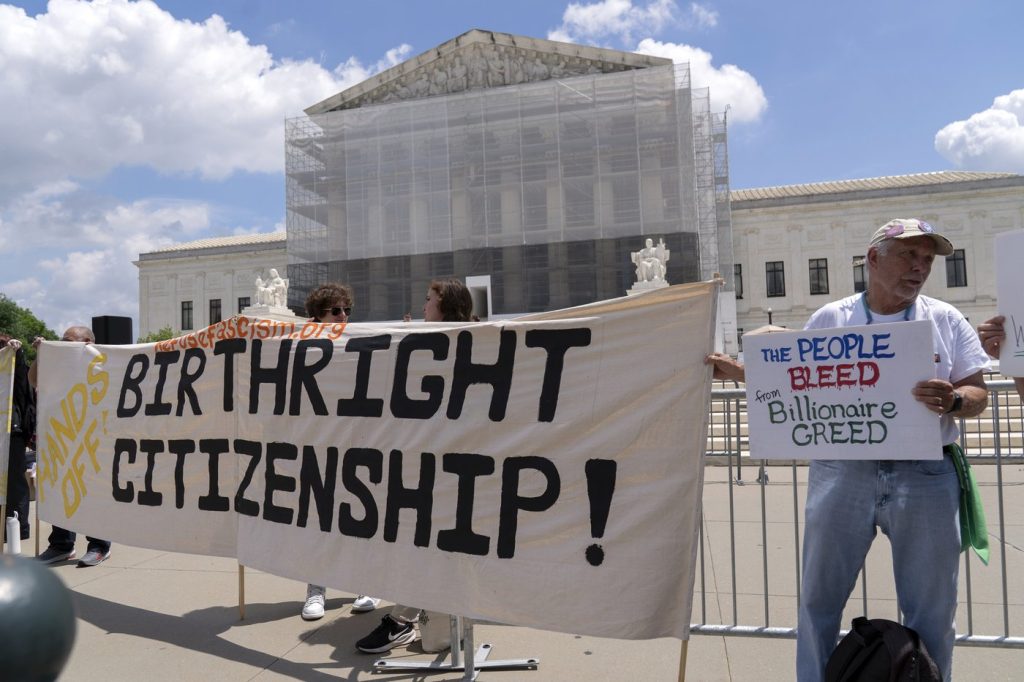BOSTON (AP) - A federal judge has issued a ruling that blocks the Trump administration's efforts to end birthright citizenship for children born to parents residing in the United States without legal authorization. This ruling marks the third time courts have intervened to halt the implementation of such an order since a significant Supreme Court verdict in June. U.S. District Judge Leo Sorokin asserted that a nationwide injunction, initially granted to over a dozen states, remains in effect, even after the Supreme Court restricted lower courts' power to issue nationwide injunctions.
The states involved in the lawsuit argue that Trump's attempt to alter birthright citizenship is blatantly unconstitutional. They claim it poses serious financial risks to health insurance programs that depend on the citizenship status of individuals. This contentious issue is poised to escalate quickly back to the Supreme Court for further review.
White House spokeswoman Abigail Jackson expressed the administration's eagerness to be vindicated in future appeals. Meanwhile, New Jersey Attorney General Matthew Platkin, who played a role in leading the legal challenge, celebrated the court's ruling, describing Trump's order as flagrantly unconstitutional. Platkin emphasized that American-born children should retain their citizenship status as per longstanding legal precedent, stating, “The President cannot change that legal rule with the stroke of a pen.”
The government’s legal team had previously argued that the scope of Sorokin's preliminary injunction should be limited to the alleged financial injuries experienced by the states. However, Sorokin dismissed this argument, claiming that a piecemeal approach would not effectively protect the states since many individuals frequently move between states. The judge criticized the Trump administration for its failure to demonstrate how a more limited injunction could be implemented practically, pointing out that their reasoning lacked legal and logical basis.
Sorokin acknowledged that his ruling is not the final interpretation of birthright citizenship and recognized that the Trump administration is entitled to seek its understanding of the Fourteenth Amendment. He indicated that the Supreme Court would ultimately provide a conclusive judgment on this matter. For now, Trump’s attempts to deny citizenship to children born to undocumented or temporarily residing parents are blocked, pending any further decisions from the Supreme Court.
Earlier in the month, a federal judge in New Hampshire delivered a similar ruling that stopped Trump's executive order from being enacted nationwide within the context of a separate class-action lawsuit. This ruling had been temporarily paused to provide the administration an opportunity to appeal, but no appeal was filed, allowing the injunction to take effect. Additionally, on Wednesday, a San Francisco-based appeals court declared the executive order unconstitutional, affirming a previous lower court's nationwide blockade, while a Maryland judge indicated willingness to follow suit with similar measures if endorsed by an appeals court.
In a recent Supreme Court ruling, it was determined that lower courts generally cannot issue nationwide injunctions, although the Court did not rule out other types of court orders that may effectuate nationwide impacts, particularly in regards to class actions and state-led lawsuits. Importantly, the Supreme Court refrained from making a determination on the core issue of the citizenship order's constitutionality.
Plaintiffs in the Boston case made the argument that birthright citizenship is fundamentally protected by the Constitution and that the President lacks the authority to issue orders undermining that protection. They stressed that Trump's executive order could strip citizenship from hundreds of thousands of American-born children, negatively affecting essential state funding for services such as foster care, healthcare for low-income children, and early intervention programs.
Central to this legal dispute is the Fourteenth Amendment, ratified in 1868 in the aftermath of the Civil War and the racially discriminatory Dred Scott Supreme Court decision, which previously denied citizenship rights to enslaved individuals. The Trump administration has contended that children of noncitizens are not “subject to the jurisdiction” of the United States and thus do not qualify for birthright citizenship. Jackson, the White House spokeswoman, criticized the court rulings, asserting that they misunderstood the intent and language of the Fourteenth Amendment.












